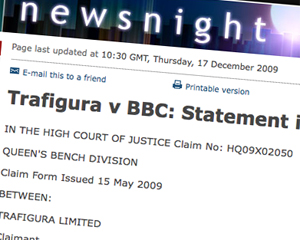Carter-Ruck has issued its response (via PR firm Bell-Pottinger) to today’s high court hearing resolution that ended the legal dispute between oil trader Trafigura and BBC Newsnight.
The BBC has agreed to apologise for allegations made about waste dumping in Côte d’Ivoire on air tonight; pay £25,000 to a charity of Trafigura’s choice, as well as legal costs.
[Full story at this link]
In a Newsnight programme in May 2009, the BBC alleged that waste dumped in Côte d’Ivoire in 2006 had caused deaths, miscarriages and serious long term health effects.
“Faced with such grave, yet wholly false, allegations, Trafigura was left with no alternative but to commence libel proceedings,” the British-based oil trading firm claimed today, through its solicitors.
Although the feature published in May 2009 disappeared from the BBC’s site last week, the text and video has been made available via the whistleblowing site Wikileaks.
In a statement today, Eric de Turckheim, founder and director of Trafigura, said:
“Trafigura has always maintained that the slops cannot have caused the deaths and serious injuries alleged by the BBC. We informed Newsnight of the detailed evidence before the programme was aired – yet they chose to proceed with their highly-damaging and false assertions. We are pleased the BBC has now acknowledged that it was wrong.
“Trafigura accepts that the Probo Koala incident is a matter of public interest. However, there is no public interest in the BBC reporting damaging untruths. Such is the international reach and high-regard of the BBC, we were left with little choice but to bring these proceedings – the only libel claim we have brought anywhere in the world against any media outlet.
“With the benefit of the facts, Mr Justice MacDuff advised the media earlier this year to take note of the evidence and approach their reporting of these matters more responsibly. We hope that, in future, they do.”
The BBC statement can be read at this link. It says: “the BBC has played a leading role in bringing to the public’s attention the actions of Trafigura in the illegal dumping of 500 tons of hazardous waste in Abidjan in 2006. The dumping caused a public health emergency with tens of thousands of people seeking treatment.”
The corporation, however, has backed down by retracting its earlier claims. It now says that “the evidence does not establish that Trafigura’s waste caused deaths, miscarriages or serious or long term injuries”.
Trafigura agreed to pay victims of the waste dumping around £30 million in compensation in September 2009, having previously paid compensation of over £100 million to the Ivory Coast government. However, the company denies liability.
In October, Trafigura’s injunction on the ‘Minton Report’ – which looked into the effects of waste dumping – was lifted, following a five week legal battle with the Guardian.
 Trafigura and its solicitors Carter-Ruck have now become synonymous with attempts to stifle free expression in the UK. First it gagged newspapers who attempted to report on waste dumping in Côte d’Ivoire with an injunction. Then it attempted to
Trafigura and its solicitors Carter-Ruck have now become synonymous with attempts to stifle free expression in the UK. First it gagged newspapers who attempted to report on waste dumping in Côte d’Ivoire with an injunction. Then it attempted to